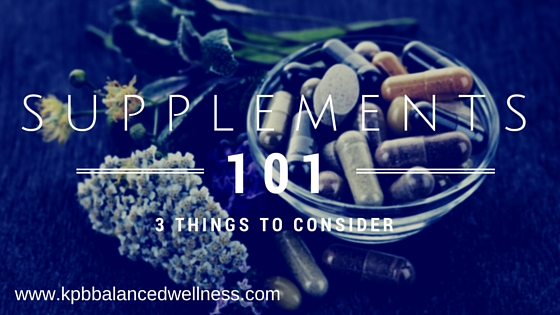Supplements. Do you need them? How do you know if what you are buying is any good? If you thought trying to buy real food has become confusing, supplements are a whole new ballgame.
Let’s tackle the first question: Are supplements needed?
First and foremost, I believe in focusing on eating a nutrient-dense diet. Supplements are meant to …. Supplement. But, for a myriad of factors: such as soil-depletion, high-stress lives, poor digestion, and the exploding number of chronic diseases we are struggling with, we all need to supplement to some degree. Think of it as an insurance policy. You’re making smart decisions for how you nourish yourself, but to help ‘top-up’ your levels you are going to take some supplements. For example, you might take vitamin D through the winter, vitamin C during cold and flu season and some magnesium to help manage stress.
Secondly, with the supplement industry being largely unregulated, I highly recommend doing a little homework before your next supplement purchase. Most off the shelf supplements are unregulated and can have up to 40% filler in them. In my practice and in my own home, I use professional-line supplements. Professional line supplements are regulated by the FDA and only allowed to have up to 2% of the ingredients as fillers. There are a handful of products that I’ll recommend off the shelf, but not without careful review first.
Here are a few things to consider when buying supplements:
-
How is the Supplement Packaged?
The tableting base is how the vitamins, minerals and herbs are packaged together and ultimately delivered to you for absorption. This is where some very unfriendly ingredients can sneak into what would have been a wholesome supplement. Even more importantly, the tableting base determines whether or not the supplement can disintegrate and be utilized by you. If the supplement is unable to disintegrate within 20 minutes in the body, you are unable to absorb any of the nutrients.
A research study done by Dr. Raimar Lobenberg and published in the Journal of Pharmacy and Pharmaceutical Sciences studied the disintegration process of 49-well known commercially available multivitamins. Of the 49, 25 did not disintegrate within the 20-minute window. Among the worst was the Kirkland Signature Formula (Costco).
To help you become aware of ingredients used as fillers, here is a list from The Micronutrient Miracle
- All artificial sweeteners
- Artificial flavors
- BHA or BHT
- Blue 1 or 2
- Cane Sugar
- Cellulose
- Corn syrup, cornstarch, or solids
- Croscarmellose sodium
- Crospovideon
- Disodium hydrogen phosphate
- Fructose
- Gelatin
- Gellan gum
- High fructose corn syrup
- Hydroxypropyl cellulose
- Hypromellose
- Magnesium or calcium stearate
- Maltodextrin
- Methylcellulose
- Microcrystalline cellulose
- Polyvinyl alcohol
- Red 40
- Shellac
- Silica
- Sodium benzoate
- Sodium starch glycolate
- Stearic acid
- Sucrose
- Sugar
- Talc
- Tapioca Syrup
- Wax
- Yellow 5 or 6
-
Synthetic vs. Whole Food
Consuming synthetic nutrients usually means you are getting a much higher dose of nutrients than using whole food formed vitamins. There are times and situations where people do need high doses of certain nutrients. The question is, do you need high doses of the nutrients you are taking? Is your body able to actually process the nutrients in synthetic form?
As a general rule, focus on whole food based vitamins. Unless you have been given a specific reason for taking high-doses of something (such as B12), consuming whole food based vitamins and supplements is easier on your digestive system. As an added bonus, whole food based nutrients typically give you the cofactors and synergistic components to support your ability to absorb and utilize the nutrients. Win-win.
-
Timing and Dosage
Did you know most nutrients are processed and eliminated within 12 hours? Nor can you absorb high doses all at once. For instance, even if a multi-vitamin has 1,200 mg of calcium in it, science has shown that you can only absorb about 600mg at once.
You need to think of taking your supplements in the same way as you do your meals. We don’t do well with anything in a single high dose once a day (or once a week for that matter), we do best with a constant steady stream of nutrition coming into our system. This is why it is often recommended that you take your supplements with each meal, to help give you a steady stream of nutrients through the day and to give you the opportunity to absorb your entire daily requirement.
Ok, great, but now what do I buy??
I hear you, even for me, it can be confusing and why I work with only a few lines in my practice. Working with a practitioner trained in functional nutrition can be really helpful in terms of finding out which high-quality supplements will be best to get your body back in balance. (Sometimes, you are taking exactly what you need to be, but you aren’t able to absorb the nutrients and this is where a practitioner is particularly helpful in aiding you to problem solve this!)
But, if you aren’t quite ready to work with a practitioner I have a great resource for you. Perfect Supplements is a direct-to-consumer line, family-owned, dedicated to being 100% pure and environmentally conscious. I have been buying the dessicated liver, cod liver oil (the best kind!) and hydrolyzed collagen. They also carry one of my favorite probiotics, Prescript-Assist, one of my favorite brands for herbs, Gaia and the best brand for transdermal magnesium. They have really done their homework to source some of the best whole food supplements in one easy to find location. All-around a great resource to get you started.
(Full disclosure: I do earn a small commission from any purchases made through these links. This supports my blog and enables me to continue providing you with great content for free.)
Tell me, what have been some of your biggest questions around supplements?
Did this help clear the muddy waters or are there still question you have?
Let me know in the comments below, I’d love to hear from you!
Resources:
Calton, J., Calton, M. (2015). The Micronutrient Miracle. New York: Rodale.
To Supplement or Not? The Ins and Outs of Dietary Supplementation, by Margaret Floyd, NTP. http://www.eatnakednow.com/supplements-necessary-or-not/
Investigation of vitamin and mineral tablets and capsules on the Canadian market, Raimar Löbenberg1, Wayne Steinke2, Faculty of Pharmcy, University of Alberta, Edmonton, Alberta, Canada, http://www.ualberta.ca/~csps/JPPS9(1)/Loebenberg.R/tablets.htm



This seems to be a supplement that is without the filler. Please tell me what you think. I checked out their FAQ and everything seems in order. They make it from actual food. Pretty cool stuff. 🙂
http://www.promanatein.com
http://www.promanateinfaq.com/can-synthetic-vitamins-hurt-me
http://www.promanateinfaq.com/why-is-promanatein-different-from-other-supplements
Have a great week,
Vince